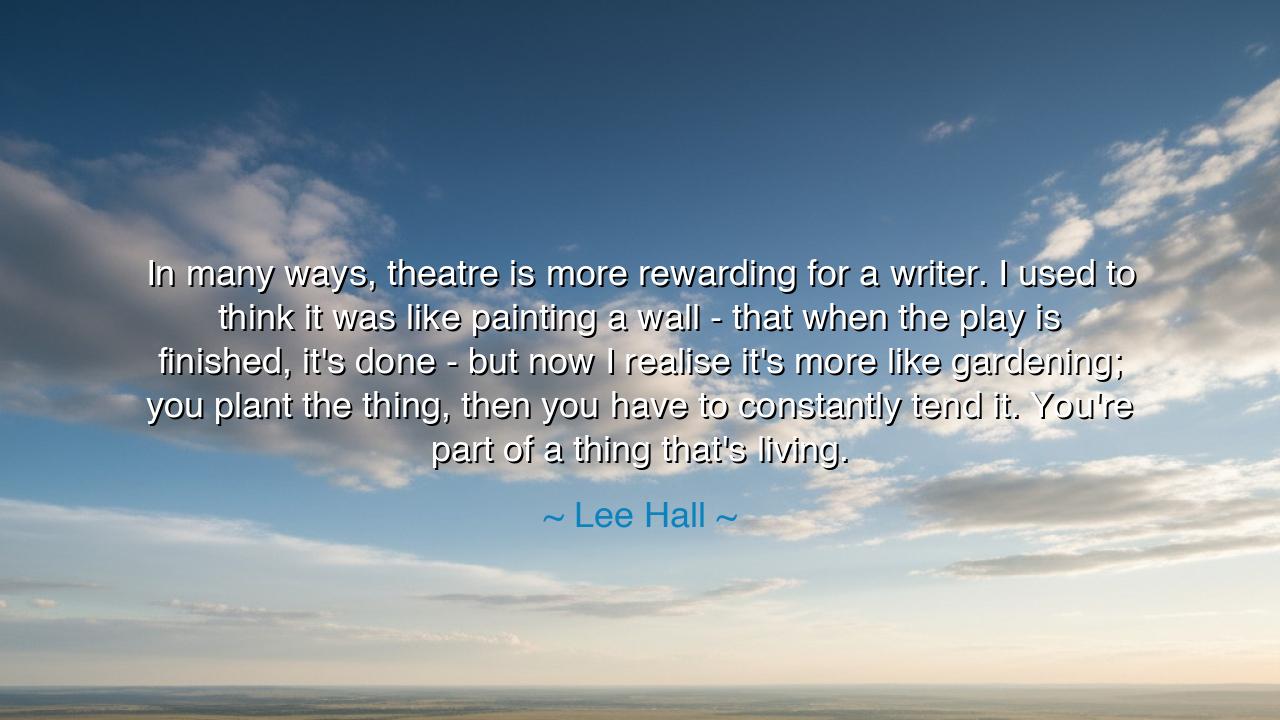
In many ways, theatre is more rewarding for a writer. I used to
In many ways, theatre is more rewarding for a writer. I used to think it was like painting a wall - that when the play is finished, it's done - but now I realise it's more like gardening; you plant the thing, then you have to constantly tend it. You're part of a thing that's living.






“In many ways, theatre is more rewarding for a writer. I used to think it was like painting a wall — that when the play is finished, it’s done — but now I realise it’s more like gardening; you plant the thing, then you have to constantly tend it. You’re part of a thing that’s living.” Thus spoke Lee Hall, the playwright and storyteller whose words unveil the sacred truth of creation — that art, like life itself, is never static, but a living thing. In this reflection, he draws a line between two ways of creating: one that ends when the work is complete, and another that breathes, grows, and transforms through time. He reminds us that theatre, unlike the solitary arts, is alive — dependent upon collaboration, renewal, and the ceaseless care of those who bring it to life. It is gardening, not painting; it is the tending of souls, not merely the shaping of surfaces.
The origin of this quote lies in Lee Hall’s long experience as a playwright, born from his journey through works like Billy Elliot and The Pitmen Painters. In the beginning, like many writers, he viewed the finished script as the endpoint — a wall, smooth and complete, its purpose fulfilled once the words were dry. But in time, he discovered that theatre does not end when the ink dries; it begins. The play, once handed to actors, directors, musicians, and audiences, takes on new life. It breathes, changes, and grows — just as a garden responds to the hands that nurture it and the seasons that pass over it. A play, once written, becomes a living collaboration, and the writer must become its gardener — pruning, watering, reshaping, and guiding it toward new bloom.
This metaphor of gardening reaches far beyond the realm of theatre. It speaks to the essence of all creation, of every endeavor born from human hands and hearts. The painter may finish his work and hang it in stillness, but the gardener’s work is never done. He must return again and again — to nurture, to mend, to renew. So too is it with relationships, with craft, and with life itself. Everything living requires attention, patience, and love. To tend a play, as Lee Hall describes, is no different from tending a child, a friendship, or a dream. It is to accept that the work is never complete, but ever becoming.
The ancients understood this truth well. The philosopher Heraclitus said that no man steps into the same river twice, for both the river and the man have changed. Likewise, a play performed one night will never be the same the next — the tone shifts, the emotions alter, the audience breathes differently. The writer, if he is wise, learns to surrender to this flow of life, to see his creation not as property but as a living presence. In this surrender, he becomes not merely a maker, but a caretaker of life. It is the difference between possession and participation — between saying “This is mine,” and saying, “I am part of this.”
Consider, for example, the story of Shakespeare himself. Though his plays are immortalized on paper, they were never meant to be fixed. In his time, scripts were living documents, rewritten to suit new actors, new settings, new audiences. The Bard did not treat his plays as sacred relics, but as gardens — pruned, rearranged, and reimagined for every season of performance. That is why his works still live today: because he planted living seeds, not stone monuments. His words were made not to endure unchanged, but to grow anew in every generation that speaks them. Lee Hall’s insight echoes this ancient truth: true art is not eternal because it is preserved — it is eternal because it is alive.
There is a deeper wisdom here about the nature of all work and purpose. Many dream of completion — of reaching the end, of resting in finality. But the gardener knows that to live is to tend endlessly. There is no “done,” only the joy of ongoing care. Whether in art, family, or vocation, the soul finds fulfillment not in the finished product, but in the continuous act of giving life. To tend what we create is to remain humble before it — to see that our task is not mastery, but service. The wall-builder may leave his mark and walk away; the gardener must stay, watch, and listen.
Therefore, my child, learn from this wisdom of Lee Hall: let your life be a garden, not a wall. Do not seek the comfort of completion, but the joy of participation. Whatever you create — a play, a craft, a relationship, a vision — treat it as something alive. Return to it with patience. Feed it with your time, your attention, and your heart. Do not be afraid when it changes, for all living things must grow and shed. The true reward of creation lies not in saying, “It is finished,” but in whispering, “It still lives.”
And remember: when you become the gardener of your own life’s work, you partake in the divine rhythm of existence. For the Creator Himself does not abandon His creation when it blooms — He walks among it, gently tending its growth. So too must you walk among the things you plant — for you are, as Lee Hall discovered, part of a thing that’s living.






AAdministratorAdministrator
Welcome, honored guests. Please leave a comment, we will respond soon